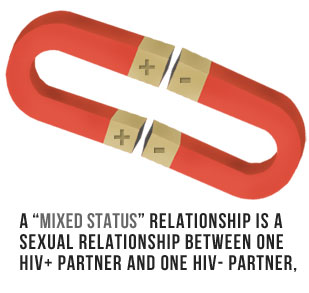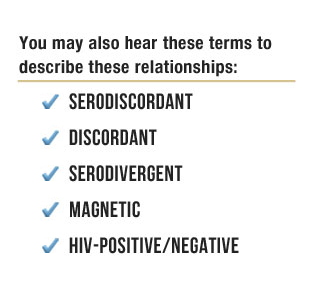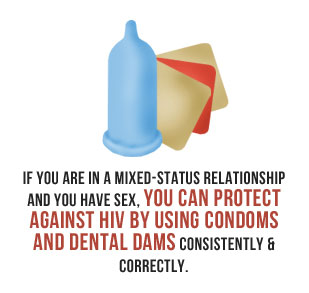Partners with different HIV statuses
A “mixed-status couple” is one in which one partner is HIV-positive and the other is HIV-negative. This is also referred to as being a “serodiscordant couples.” Mixed-status couples face unique challenges, particularly around sexual intimacy.
All couples, regardless of each partner’s HIV status, should be aware of the need to protect themselves from sexually transmitted diseases, including HIV. But for mixed-status couples, the possibility of infection is a constant reality.
Communication Is Key
If you and your partner are a mixed-status couple, it is important that the two of you communicate with each other on a regular and ongoing basis about your intimate relations. It’s possible that you or your partner may be uncomfortable with sex after learning that you have HIV. If this is the case, keep in mind that you can both enjoy hugging, kissing, and touching. These actions carry no risk for HIV infection, and will definitely make you both feel better. Some mixed-status couples may become so careful and fearful of infection that they limit or even stop sexual activity. This can have negative effects on their relationship. Your feelings or your partner's feelings about sexual activity may change with time and as you and he or she learn more about HIV and sex. Some people find it helpful to talk things over with a professional or in a support group.
Practicing Safer Sex
If you decide to engage in sexual activity, when you and your partner have sex (anal, oral, or vaginal), you can protect against transmitting HIV and transmitting or acquiring other sexually transmitted infections by using condoms and dental dams consistently and correctly. Health care providers and local HIV/AIDS organizations can be important sources of information and support for you and your partner.
For more information on using condoms and dental dams, see the Department of Veterans Affairs' great, plain-language Tips for Using Condoms and Dental Dams.
Treatment As Prevention
Also, if you are HIV-positive being on antiretroviral therapy can lower the risk of transmitting HIV to your HIV-negative partner. Taking all your medications, on time, will help to lower the viral load in your body fluids and decrease the chance that you will transmit HIV to your partner. But remember, even if you have a low viral load, you can still transmit HIV to your sex partner. So it is important to always use a condom and practice safer sex. And, if you inject drugs, never share syringes, water, or drug preparation equipment with others since HIV-infected blood can be transmitted through them.
For more information, see the University of California, San Francisco’s HIVInSite: Links for Serodiscordant Couples.![]()
Fact Sheets & Print Materials
- CDC – Serodiscordant Couples
- CDC – Protect Yourself. Protect Others (PDF)
- AIDSinfo – Couples With Mixed HIV Status
 (PDF)
(PDF) - CDC – Oral Sex And HIV Risk (PDF)
- CDC – Pre-Exposure Prophylaxis (PDF)
Related Topics on AIDS.gov
Frequently Asked Questions
If I test HIV-negative, does that mean that my sex partner is HIV-negative also?
No. Your HIV-test result reveals only your HIV status. Your negative test result does not indicate whether or not your partner has HIV. HIV is not necessarily transmitted every time you have sex. Therefore, your taking an HIV test should not be seen as a method to find out if your partner is infected. Ask your partner if he or she has been tested for HIV and what risk behaviors he or she has engaged in, both now and in the past. Think about getting tested together.
http://www.cdc.gov/hiv/topics/testing/resources/qa/results.htm
I don’t have any symptoms of HIV. Wouldn’t I be sick if I had gotten HIV from my partner?
The only way to know if you are infected is to be tested for HIV infection. You can never rely on symptoms to know whether or not you are infected. Many people who are infected with HIV do not have any symptoms at all for 10 years or more. For information on where to find an HIV testing site, visit the National HIV Testing Resources website at HIVtest.org ![]() or call the CDC’s information hotline 24 hours a day at 1-800-CDC-INFO (232-4636).
or call the CDC’s information hotline 24 hours a day at 1-800-CDC-INFO (232-4636).
http://www.cdc.gov/hiv/resources/qa/qa5.htm
Additional Resources
- CDC – Prevention IS Care campaign
- CDC – Living With HIV/AIDS
- CDC’s Dr. Kevin Fenton on CNN about PrEP – After HIV pill news, now comes the tricky part
- CDC – Prevention Is Care campaign
- NIH AIDSinfo Reproductive Options for HIV-Concordant and Serodiscordant Couples
- The Body – Resources for Mixed (HIV-Positive/Negative) Couples

- The Body – Serodiscordant Relationships

Last revised: 06/11/2012



